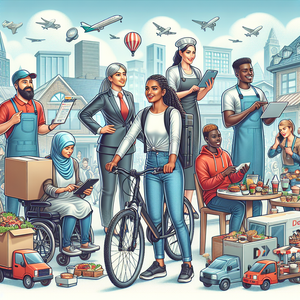The Gig Economy Renaissance: Transforming Employment Through Food Delivery Apps

The emergence of food delivery apps such as Uber Eats, DoorDash, and Grubhub has revolutionized how we access food. What began as a convenience-driven service has evolved into a complex ecosystem that connects consumers, restaurants, and drivers. The proliferation of smartphone technology and shifting consumer habits have fueled exponential growth in the food delivery industry, creating a new employment landscape characterized by flexibility and autonomy. In 2020, the food delivery market was valued at approximately $26.5 billion in the United States alone, and projections estimate it will grow to over $32 billion by 2024. This rapid expansion underscores the increasing reliance on gig platforms, showcasing not only a shift in consumer behavior but also a new avenue for employment.
Personal Stories: The Drivers Behind the Wheel
At the heart of the gig economy are the personal narratives of its workers. Take Sarah, a single mother of two who turned to food delivery after losing her job during the pandemic. With the ability to set her own hours, Sarah found a way to balance parenting with earning a living. "I can work when my kids are at school or asleep, which is a game-changer for me," she shares. Sarah's experience is emblematic of many drivers who appreciate the flexibility that gig work offers, enabling them to pursue other responsibilities or passions alongside their jobs. Similarly, Mark, a recent college graduate, found himself underemployed in a competitive job market. Frustrated with traditional 9-to-5 roles, he turned to food delivery as a stopgap solution. However, he soon discovered that he could earn more than he initially anticipated. "I can make my own schedule, and on busy weekends, I can earn a significant amount in just a few hours," Mark explains. His story illustrates how gig work can serve as an effective alternative for those seeking financial stability and independence. These personal accounts highlight the diverse motivations that draw individuals to the gig economy, showcasing its appeal to a wide range of demographics, from students to parents to retirees.
The Broader Implications: A Shift in Employment
The rise of food delivery apps signals a broader shift in the employment landscape. As more individuals opt for gig work, traditional employment models are being challenged. The flexibility of gig work appeals to an array of workers, yet it also raises significant questions about job security, benefits, and worker rights. Many gig workers lack access to traditional employment benefits, such as health insurance, paid leave, and retirement plans, leaving them vulnerable in times of crisis. According to a 2021 report from the Economic Policy Institute, about 30% of gig workers earn less than the minimum wage when accounting for costs associated with their work. This reality underscores the need for policy reform to protect the rights of gig workers and ensure fair compensation. Moreover, the gig economy often blurs the lines between employment and entrepreneurship. Many drivers leverage their experiences and earnings to fund start-ups or pursue creative endeavors, showcasing the entrepreneurial spirit that gig work can foster. For instance, some drivers use their time on the road to brainstorm business ideas, turning their gig work into a stepping stone toward launching their ventures.
Looking Ahead: The Future of Work
As the gig economy continues to grow, it is essential to address its implications for the future of work. Companies and policymakers must confront the challenges faced by gig workers, including safety, fair pay, and access to benefits. Innovative solutions, such as portable benefits and improved safety protocols, could help bridge the gap between gig work and traditional employment. Additionally, as more individuals enter the gig economy, there exists an opportunity for community-building among drivers. Platforms could facilitate connections, allowing workers to share tips, resources, and support. This could help create a more sustainable and empowered workforce, fostering a sense of belonging within the gig community. The potential for collaboration among gig workers is immense. Online forums and local meetups could enable drivers to exchange insights on maximizing earnings, navigating challenges, and even advocating for their rights collectively.
The gig economy renaissance, particularly through food delivery apps, is reshaping traditional employment in profound ways. Personal stories of drivers like Sarah and Mark illustrate the appeal of flexibility and financial independence, while also raising critical questions about the future of work. As we navigate this evolving landscape, it is crucial to advocate for the rights and well-being of gig workers, ensuring that the advantages of this new economy are accessible to all. By doing so, we can harness the potential of the gig economy to create a work environment that is not only flexible but also equitable and sustainable for the future.
Food Delivery Operations Manager
DoorDash, Uber Eats
Job Description
Oversee the logistics and operational efficiency of food delivery services.
Coordinate between restaurants, drivers, and customers to ensure timely deliveries.
Analyze data to optimize delivery routes and improve service quality.
Required Skills
Strong analytical abilities
Experience in supply chain management
Familiarity with logistics software
Customer Support Specialist for Food Delivery Apps
Grubhub, Postmates
Job Description
Provide assistance to customers experiencing issues with orders, payments, or delivery.
Handle inquiries through various channels, including chat, email, and phone, while maintaining a positive customer experience.
Utilize CRM software to track issues and resolutions, ensuring consistent follow-up and reporting.
Essential Skills
Excellent communication
Problem-solving
Empathy
Delivery Driver Recruiter
Instacart, Uber Eats
Job Description
Focus on sourcing, interviewing, and hiring drivers for food delivery services.
Develop and implement recruitment strategies to attract a diverse pool of candidates.
Collaborate with team leaders to understand driver needs and adjust hiring practices accordingly.
Key Qualifications
Experience in recruitment
Strong interpersonal skills
Knowledge of labor market trends
Marketing Specialist for Food Delivery Services
Grubhub, DoorDash
Job Description
Develop and execute marketing campaigns to attract new users and retain existing customers.
Analyze market trends and consumer behavior to tailor promotional efforts effectively.
Collaborate with cross-functional teams to create engaging content for social media, email marketing, and advertisements.
Required Skills
Digital marketing expertise
Creativity
Proficiency with marketing analytics tools
Data Analyst for Gig Economy Platforms
Lyft, Postmates
Job Description
Analyze user data to identify trends and inform business decisions regarding driver performance and customer satisfaction.
Create reports and visualizations to communicate findings to stakeholders.
Collaborate with product teams to enhance app features based on data insights.
Essential Skills
Proficiency in data analysis tools (e.g., SQL, Python)
Critical thinking
Experience in the gig economy


